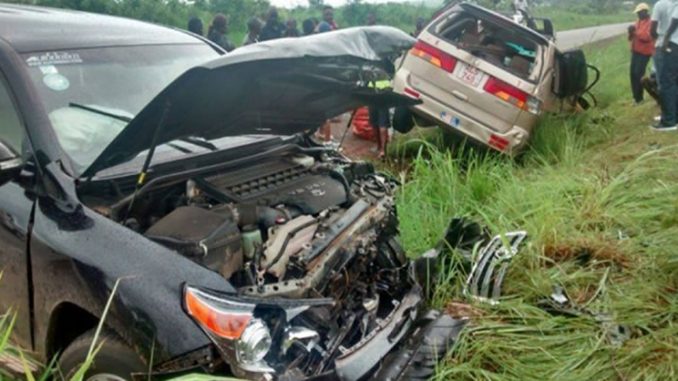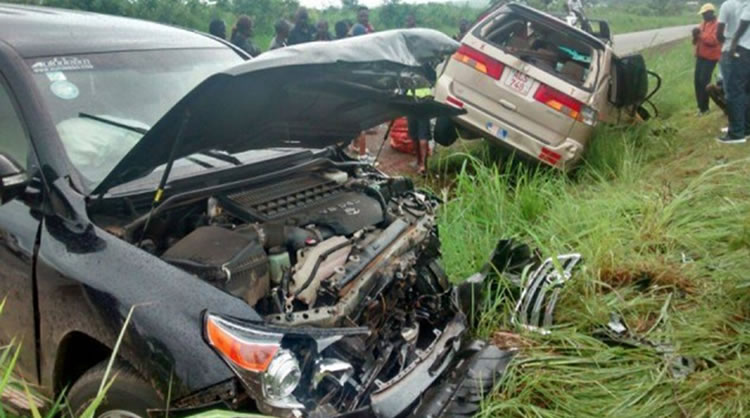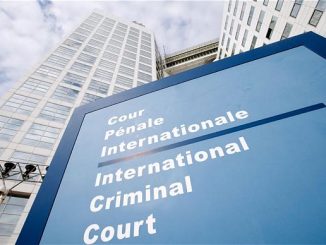
The Government of Sierra Leone, and indeed the President of the Republic has espoused the benefits of road infrastructure development as one of the main achievements in the country’s development agenda. While we appreciate the Government’s achievement in this area of development we are equally concerned about the number of people that are losing their lives on the. According to statistics obtained from the Sierra Leone Police Traffic Management and Road Safety Directorate, road accidents accounted for an average 16.25 premature deaths per month in the year 2015. We all know the reasons for this carnage on our roads:
• Lack of proper system for training, testing and certification of drivers
• Dysfunctional system for the registration, testing and licensing of vehicles
• Design of the road network to enhance safety, operability and the efficient movement of people and goods traffic
• Driver behaviour especially regarding negligence, failure to observe traffic signs and signals and adhering to traffic laws and regulation
• Excessive speeding by motorists especially along major highways
• Driving/riding under the influence of alcohol and illegal substance.
The most difficult aspect of any change management solution is that of influencing peoples’ attitude and behaviour. From illegal street traders to commercial bike riders; motorists to pedestrians; truck pushers to kekeh riders all are guilty of the failure to adhere to simple norms of behaviour to use the road safely. This calls for a robust public education and awareness system. In other words, attitudinal and behavioural change.
When it comes to the institutions that are responsible for developing and implementing our traffic rules and regulation that is a different ball game altogether. We need to examine the functionality of these institutions and develop systems to enable them to operate according to their legal mandate. There are many overlaps in their duties as well as the guarding of turfs making it difficult for coordinated and functional system of enforcement to be in operation. Traffic Wardens versus Traffic Police and Police versus City Council officials all working in different directions and focusing more on the collection of fines for traffic offences rather than enforcing the law to prevent road accidents.
With any problem, there may be several solutions but when it comes to road accident, we must develop scientific methods of analysing the problem and identify remedial measures that are measurable, cost-effective and serve the needs of the entire citizenry.
ROAD ACCIDENT PREVENTION
The African Road Safety Action Plan that was developed in Addis Ababa in 2011 by a team of experts, myself included identified the five pillars of the Decade of Action for Road Safety 2011-2020, namely: (i) Road Safety Management which concerns the institutional framework needed to implement road safety activities, and thereby sets the oversight of all other pillars; (ii) Safer roads and mobility that deals with road development, the safety of all road users, especially pedestrians and other vulnerable users; (iii) Safer vehicles which focuses on standards, entry and exit of vehicles into and from countries; (iv) Safer drivers and other road users that addresses driver training, testing and licensing, driving permits and enforcement of the driving code, awareness and education of the public, and the development of a safety culture, and (v) Post-crash response which deals with onsite care, transport and trauma care of injured.
Post-crash management is a long- term effort. It needs to consider on-site care, transport of the injured to appropriate medical facilities, and the trauma care of the injured. Emergency communication systems, equipment and training for accident on-site care, and an ambulance service along priority roads are the first steps to be taken.
For the purpose of this article the main focus is on the fifth pillar – Post Crash Response.
There is the urgent need to Identify the main cause of accidents involving mostly commercial vehicles and indeed private vehicles in Sierra Leone, by supporting accident causation studies which apply modern methodology using Information and Communication Technology (ICT) systems to improve road safety by effectively targeting those main accident causes. To achieve this objective, it is necessary for consideration to be given to the establishment of an al -inclusive Accident Investigation Unit is Sierra Leone.
ESTABLISHING AN ACCIDENT INVESTIGATION AND ANALYSIS UNIT IN SIERRA LEONE
The African Action Plan for Plan for the UN Decade of Action for Road Safety (2011 – 2020) recommends that Members States should establish effective safety engineering units in roads agencies with responsibilities to strengthen safety considerations in roads development. This must also be supported by a robust system for conducting accident investigation and analysis supported by the collection, analysis and evaluation of data that will provide details about the root cause of road accidents especially in high risk areas (black spots). This in short calls for the need for the enforcement authorities to have a Post-Crash database system that is constantly reviewed and updated.
Accident analysis is carried out in order to determine the cause or causes of an accident or series of accidents so as to prevent further incidents of a similar kind. It is also known as accident investigation. It may be performed by a range of experts, including forensic scientists, forensic engineers or health and safety advisers. Accident analysis is performed in four distinct stages:
• Fact gathering: After an accident happened a forensic process starts to gather all possibly relevant facts that may contribute to understanding the accident.
• Fact Analysis: After the forensic process has been completed or at least delivered some results, the facts are put together to give a “big picture.” The history of the accident is reconstructed and checked for consistency and plausibility.
• Conclusion Drawing: If the accident history is sufficiently informative, conclusions can be drawn about causation and contributing factors.
• Counter-measures: In some cases, the development of counter-measures is desired or recommendations have to be issued to prevent further accidents of the same kind.
The benefit of this approach is such that it will assist in the existing and future policy development process to reduce road crashes on our roads. In the case of Sierra Leone, the Accident Investigation Unit may comprise of representatives from the Sierra Leone Road Safety Authority (SLRSA); Sierra Leone Roads Authority (SLRA); Coalition of Civil Society (CARL); Insurance Commission; Sierra Leone Police; and the Judiciary. The reports produced by the Unit will assist in not only identifying the causes of accidents but also help towards providing long-term accident preventive measures.
CONCLUSION
Sierra Leone is losing a lot of young productive citizens due to road accidents. We all know the causes of these accidents even without proper scientific evidence. However, the need for scientific evidence is that they may be used to examine claim for damages as well as used in evidence to prosecute those that are liable for wilful and/or contributory negligence.
We cannot continue with a ‘do nothing strategy’ there have been calls in social media for consideration to be given to prosecution of authorities that have reneged on their duties to among other, conduct a proper driver testing and licensing system; carry out proper road worthiness tests in line with the requirement for vehicle registration; and above all enforce traffic rules and regulations without fear or favour.
It is about time that agencies that fail to perform their regulatory and enforcement functions are held accountable for their actions. We owe it to all the departed souls in our nation to put in place proper systems to make those who wilfully neglect their duties are held accountable. In the case of public institutions, the management of such institutions should take responsibility for their actions, and at the same time institutions should be made to pay punitive damages to the victims and their families.
May the souls of all the departed due to the absolution of duties by responsible individuals/institutions rest in perfect peace.
Victor Ako Mengot
Technical Coordinator Campaign for Safer Roads in Sierra Leone




